
The black-headed lapwing or black-headed plover is a large lapwing, a group of largish waders in the family Charadriidae. It is a resident breeder across sub-Saharan Africa from Senegal to Ethiopia, although it has seasonal movements. It lays two or three eggs on a ground scrape.
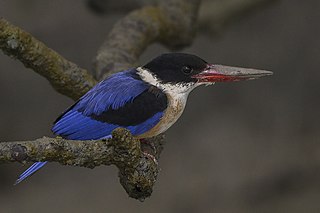
The black-capped kingfisher is a tree kingfisher which is widely distributed in tropical Asia from India east to China, Korea and Southeast Asia. This most northerly of the tree kingfishers is resident over much of its range, but northern populations are migratory, wintering south of their range in Sri Lanka, Thailand, Borneo and Java. It is distinctive in having a black cap that contrasts with the whitish throat, purple-blue wings and the coral red bill. The species is mainly found in coastal and mangrove habitats but can sometimes be found far inland.

The white-lined tanager is a medium-sized passerine bird in the tanager family Thraupidae. It is a resident breeder from Costa Rica south to northern Argentina and on the islands of Trinidad and Tobago.
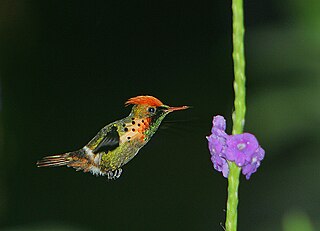
The tufted coquette is a tiny hummingbird that breeds in eastern Venezuela, Trinidad, Guiana, and northern Brazil. It is an uncommon but widespread species, and appears to be a local or seasonal migrant, although its movements are not well understood.
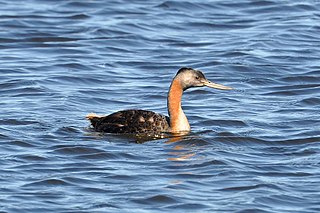
The great grebe is the largest species of grebe in the world. A disjunct population exists in northwestern Peru, while the main distribution is from extreme southeastern Brazil to Patagonia and central Chile. The population from southern Chile is considered a separate subspecies, P. m. navasi.
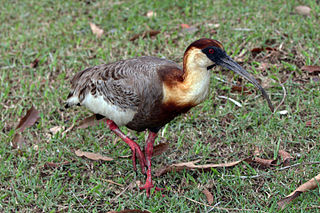
The buff-necked ibis, also known as the white-throated ibis, is a fairly large ibis found widely in open habitats of eastern and northern South America. It formerly included the similar black-faced ibis as a subspecies, but that species is almost entirely restricted to colder parts of South America, has a buff lower chest, and lacks the contrasting large white wing-patches.

The rufescent tiger heron is a species of heron in the family Ardeidae. It is found in wetlands from Central America through much of South America.

The black nunbird is a species of near-passerine bird in the family Bucconidae, the puffbirds, nunlets, and nunbirds. It is found in Brazil, French Guiana, Guyana, Suriname, and Venezuela.
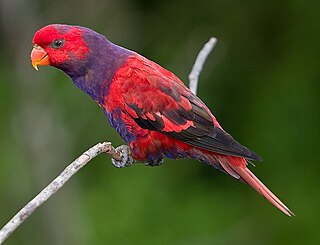
The violet-necked lory is a species of parrot in the family Psittaculidae. It is endemic to Indonesia, where it is found in the northern Maluku Islands and west Papuan islands. Its natural habitats are tropical moist lowland forests and tropical mangrove forests.
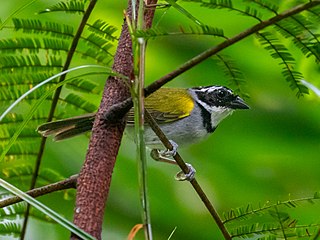
The pectoral sparrow is a species of bird in the family Passerellidae. It is found in Bolivia, Brazil, Colombia, French Guiana, Guyana, Peru, Suriname, and Venezuela. Its natural habitat is subtropical or tropical moist lowland forests. The Brazilian name for this species is tico-tico-de-bico-preto, which in translation means "black billed sparrow".

The hooded butcherbird is a species of passerine bird in the family Artamidae. It is found in New Guinea. Its natural habitat is subtropical or tropical moist lowland forest.

The variegated antpitta is a species of bird in the family Grallariidae. It is found in southeastern Brazil, eastern Paraguay, the Guianas and the northern Amazon Basin. Its range extends to Venezuela in the northwest; in the Amazon Basin, it is found in the downstream half of the basin, as well as in the Atlantic outlet region of the neighboring Tocantins-Araguaia River drainage to the southeast. A minor disjunct population is in Peru, and an Argentinian population is found in the tongue of land between Paraguay and southern Brazil.
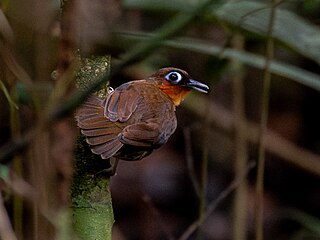
The rufous-throated antbird is a species of bird in the family Thamnophilidae. It is found in Brazil, French Guiana, Guyana, Suriname, and Venezuela. Its natural habitat is subtropical or tropical moist lowland forests.
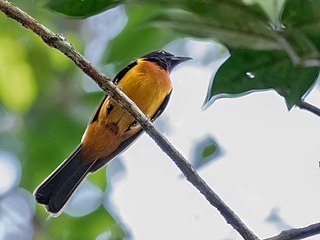
The fulvous shrike-tanager is a South American bird in the tanager family Thraupidae. It is found in Brazil, Colombia, Ecuador, French Guiana, Guyana, Peru, Suriname, and Venezuela. Its natural habitat is subtropical or tropical moist lowland forests.

The helmeted pygmy tyrant is a species of bird in the family Tyrannidae. It is found in Brazil, Colombia, French Guiana, Guyana, Peru, Suriname, and Venezuela. Its natural habitats are subtropical or tropical moist lowland forests and heavily degraded former forest.
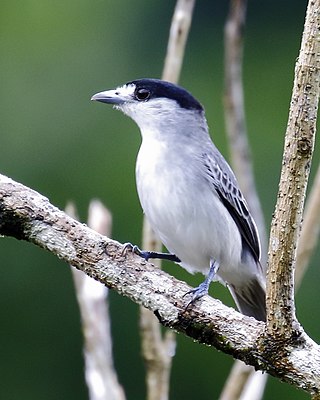
The cinereous becard is a species of bird in the family Tityridae. The term cinereous describes its colouration. It has traditionally been placed in Cotingidae or Tyrannidae, but evidence strongly suggest it is better placed in Tityridae, where it is now placed by the South American Classification Committee.

The rusty-collared seedeater is a species of bird in the family Thraupidae, formerly placed in the related Emberizidae.
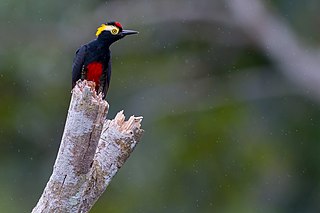
The yellow-tufted woodpecker is a species of woodpecker. It is found in Bolivia, Brazil, Colombia, Ecuador, French Guiana, Guyana, Peru, Suriname, and Venezuela. Its natural habitats are subtropical or tropical moist lowland forests and heavily degraded former forest.

The Guianan warbling antbird is an insectivorous bird in the antbird family, Thamnophilidae. It is found at lower levels in humid forest in the Guianas, far eastern Venezuela, and north-eastern Brazil.

The scarlet flycatcher or austral vermilion flycatcher is a species of flycatcher, closely related to the vermilion flycatcher. It is found in southeastern Bolivia and Brazil, Paraguay to Argentina and Uruguay. It is recognized as a species by some taxonomic authorities, including the International Ornithologists' Union. Others still consider it to be a subspecies of the vermilion flycatcher.






















